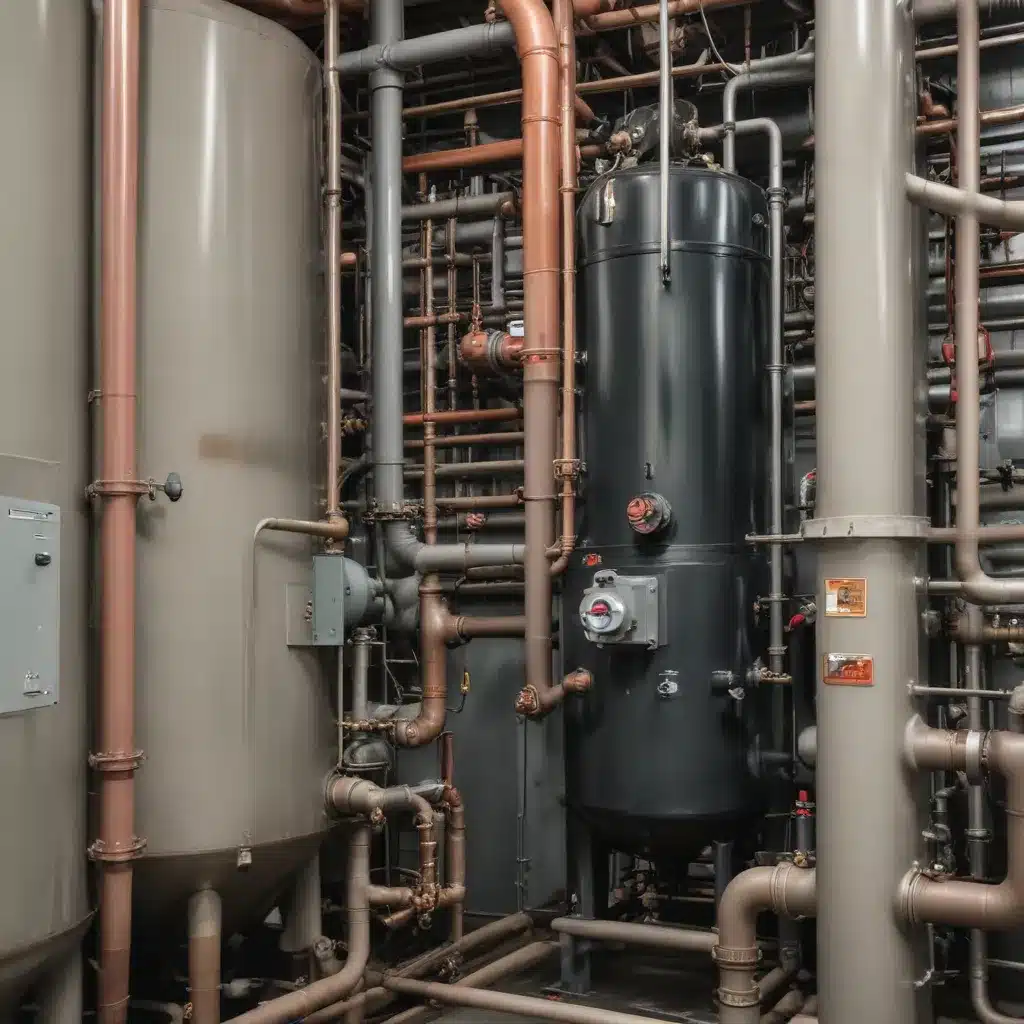
The Importance of Proper Boiler Feedwater Treatment
As a seasoned expert in plumbing and heating services, I have witnessed firsthand the critical role that boiler feedwater treatment plays in maintaining the efficiency, reliability, and longevity of heating systems. Boilers are the heart of many home heating solutions, but without proper care and maintenance, they can quickly succumb to the damaging effects of scale buildup, corrosion, and bacterial growth.
In this comprehensive guide, we’ll delve into the essential aspects of boiler feedwater treatment, exploring practical strategies to protect your heating system’s lifespan and ensure optimal performance.
Understanding Boiler Feedwater Challenges
Boilers operate by converting water into steam, which is then used to distribute heat throughout a building. However, the water used to feed the boiler can contain a variety of impurities, such as dissolved minerals, oxygen, and even harmful bacteria, that can wreak havoc on the system over time.
As the steam forms, these impurities can be left behind, leading to the accumulation of scale on the boiler’s internal surfaces. This scale acts as an insulator, hindering the boiler’s ability to effectively transfer heat. Over time, the scale can become so severe that it drastically reduces the boiler’s efficiency, forcing it to work harder and consume more energy to maintain the desired temperature.
In addition to scale buildup, boiler feedwater can also contribute to corrosion, which can weaken the system’s components and lead to leaks or even catastrophic failures. Furthermore, the presence of bacteria in the feedwater, such as Legionella, can pose a serious health risk, making proper water treatment a crucial safety concern.
Addressing Boiler Feedwater Challenges
To protect your heating system’s lifespan, it’s essential to implement a comprehensive boiler feedwater treatment strategy. This approach involves a combination of filtration, chemical treatment, and ongoing monitoring to ensure the water feeding the boiler is free from contaminants.
Filtration and Demineralization
One of the most effective ways to address impurities in boiler feedwater is through filtration and demineralization. This process involves the use of specialized filters and ion exchange resins to remove dissolved minerals, such as calcium and magnesium, which can contribute to scale formation.
By removing these minerals, the water becomes “softened,” reducing the risk of scale buildup and extending the boiler’s lifespan. Additionally, the filtration process can help remove suspended solids, further protecting the boiler’s internal components from wear and tear.
Chemical Treatment
In addition to filtration, chemical treatment plays a crucial role in maintaining the quality of boiler feedwater. Chemical additives can be used to:
- Oxygen Scavenging: Removing dissolved oxygen from the feedwater helps prevent corrosion of the boiler’s metal components.
- pH Adjustment: Ensuring the feedwater’s pH is within the optimal range can help mitigate the effects of acidity and further reduce the risk of corrosion.
- Scale Inhibition: Specialized chemicals can be added to the feedwater to prevent the formation of scale, preserving the boiler’s heat transfer efficiency.
- Biocide Treatment: Introducing biocides into the feedwater can effectively control the growth of harmful bacteria, such as Legionella, safeguarding both the system and human health.
By implementing a carefully tailored chemical treatment regimen, you can create an environment within the boiler that is inhospitable to scale, corrosion, and bacterial contamination, prolonging the system’s lifespan and ensuring reliable performance.
Ongoing Monitoring and Maintenance
Maintaining the quality of boiler feedwater is an ongoing process that requires regular monitoring and maintenance. This includes:
- Water Quality Testing: Periodic testing of the feedwater’s chemical composition and impurity levels can help identify any issues early on, allowing for prompt corrective action.
- System Flushing: Regularly flushing the boiler and associated piping can help remove any accumulated scale or debris, keeping the system operating at peak efficiency.
- Preventive Maintenance: Scheduling routine inspections and maintenance tasks, such as cleaning or replacing filters and checking for leaks, can help catch and address problems before they escalate.
By staying vigilant and proactively addressing any feedwater-related issues, you can ensure your boiler continues to operate safely, efficiently, and with minimal downtime.
The Benefits of Proper Boiler Feedwater Treatment
Investing in a comprehensive boiler feedwater treatment strategy offers a multitude of benefits that can significantly enhance the performance and longevity of your heating system. These benefits include:
- Improved Energy Efficiency: By preventing scale buildup and maintaining optimal heat transfer, a properly treated boiler can operate more efficiently, reducing energy consumption and lowering your heating costs.
- Increased System Lifespan: Protecting the boiler’s internal components from the damaging effects of scale, corrosion, and bacterial growth can dramatically extend the system’s useful life, potentially saving you the expense of premature replacement.
- Enhanced Reliability: With fewer breakdowns and less need for costly repairs, a well-maintained boiler that receives proper feedwater treatment is more likely to provide consistent and dependable heating, ensuring your home’s comfort year-round.
- Improved Safety: By controlling the growth of harmful bacteria, such as Legionella, boiler feedwater treatment helps safeguard the health and well-being of your family and anyone who may come into contact with the system.
- Reduced Maintenance Costs: Proactive feedwater treatment can minimize the need for frequent system flushing, component replacements, and other maintenance tasks, resulting in significant cost savings over the long term.
Conclusion: Invest in Your Heating System’s Future
Protecting the lifespan of your boiler is a wise investment that can pay dividends for years to come. By implementing a comprehensive boiler feedwater treatment strategy, you can help ensure your heating system operates at peak efficiency, reliability, and safety, while also minimizing the financial burden of costly repairs and premature replacements.
If you’re unsure where to start or have questions about your specific heating system, I encourage you to contact the experts at DD Plumbing and Heating. Our team of seasoned professionals can assess your needs, provide tailored recommendations, and guide you through the process of implementing an effective boiler feedwater treatment solution that will safeguard the long-term health of your home’s heating system.


